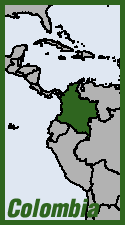 With Colombia's new conservative president threatening to roll back the country's ground-breaking decriminalization policy, a group of young activists in Bogotá held a public cannabis smoke-in to demand their right to the "personal dose." But, in what seems like a foreboding sign, it was quickly broken up by the feared National Police riot squad.
With Colombia's new conservative president threatening to roll back the country's ground-breaking decriminalization policy, a group of young activists in Bogotá held a public cannabis smoke-in to demand their right to the "personal dose." But, in what seems like a foreboding sign, it was quickly broken up by the feared National Police riot squad.
Since the right-wing Iván Duque was sworn in as Colombia's president last month, many have expressed fears that he will reverse the country's recent progress toward a more tolerant drug policy and de-escalation of its long crisis of nightmarish narco-violence.
The fears seemed vindicated in early September, when Duque announced that in response to a supposed "citizen outcry," he would issue a decree allowing police to confiscate illegal drugs, including cannabis—even if the quantity falls within the "personal dose" long tolerated under Colombia's decrim policy.
'Yes to the personal dose!'
One group of daring young activists in the capital Bogotá immediately responded by holding a fumatón—a public cannabis smoke-in. As the daily El Tiempo reports, some 50 members of the "Colectivo Dosis Personal" gathered at midday Sept. 6 at Independence Park, outside the Bogotá Planetarium, with banners reading "Sí a la dosis personal" (Yes to the personal dose). They soon proceeded to light up the joints they'd come prepared with. Camila Benavides, one of the organizers, told the crowd: "Yes to the personal dose, because we are not a danger to society, and we are not harming anybody."
But just 15 minutes into the party, the Mobile Anti-Disturbance Squad (ESMAD) showed up—the notorious elite unit ot the Colombia's National Police force. The ESMAD has been repeatedly deployed across the country to break up protests over the years—sometimes with deadly results. The activists responded by chanting a slogan that ironically contrasted their harmless behavior with the violence that the riot squad is famous for: "¡Estamos sanos, déjenos sanos!" (We are healthy, leave us healthy!) Nonetheless, the ESMAD troops hurled tear-gas canisters and charged into the crowd, swinging their batons. They chased down the activists as they scattered, and seven were arrested.
This was the second fumatón the collective held this year; the first was May 5—timed to coordinate with the Global Marijuana March—at Bogotá's Parque de Los Hippies. (Hippie Park is now the official name of this small square that has been the city's counterculture hang-out since the '60s.) No arrests were reported at the May smoke-in—but the repression at the September reprise is an ominous sign.
Since a ruling of Colombia's Supreme Court in 1994, cannabis and cocaine have been decriminalized in small quantities—established by the judiciary as up to 22 grams of cannabis or one gram of cocaine. Colombia was one of the first countries in South America to decriminalize—largely as a result of the horrific narco-violence, and a growing sense that that the hardline policy was counter-productive.
The hardline President Alvaro Uibe in 2010 pushed through a legislative reform that overturned the decrim policy, but it was restored two years later by his more tolerant successor Juan Manuel Santos. Now the pendulum is swinging back toward the hard line. As El Espectador reported Sept. 4, Duque announced his intention to issue a decree allowing police to confiscate "personal doses," saying the policy is being used as a cover to facilitate "micro-trafficking." He has not yet publicly broached a return to arresting those in possession of a "personal dose," as Uribe had sought. But many fear that could be next. Advocates also point out that allowing the cops to confiscate opens the door to police corruption, an endemic problem in the country.
Cannabis in the countryside
The greater issue, however, may be Duque's policy for the coca and cannabis cultivation zones of the countryside. As El Espectador also notes, campesino growers are waiting to see if Duque will honor his predecessor's commitment to seek alternatives to eradication of illegal crops, as mandated by terms of the 2016 peace accords with the FARC guerillas. The National Coordinator of Coca, Opium and Marijuana Producers (COCCAM) sent a letter to Duque after his inauguration demanding that he maintain the government's "crop substitution" program, rather than retuning to forced eradication.
COCCAM has also proposed that illicit crops such as coca and cannabis not only be "substituted" with other crops, but that the "illicit uses" of such crops also be substituted with licit ones—such as coca-based products and medical marijuana. And indeed, a medical marijuana industry is starting to emerge in Colombia—but whether peasant producers will have a place in it is a question that the country's drug reform advocates are still grappling with.
Cross-post to Cannabis Now







Recent comments
4 weeks 5 days ago
4 weeks 6 days ago
7 weeks 6 days ago
8 weeks 6 days ago
12 weeks 6 days ago
16 weeks 4 days ago
20 weeks 5 days ago
21 weeks 3 days ago
31 weeks 3 days ago
35 weeks 3 days ago